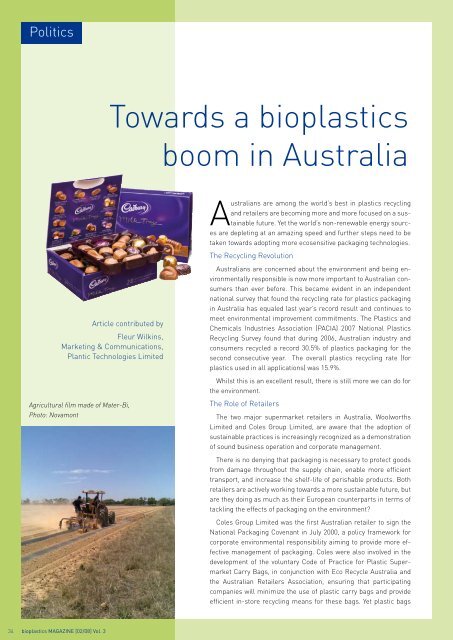02 | 2008
You also want an ePaper? Increase the reach of your titles
YUMPU automatically turns print PDFs into web optimized ePapers that Google loves.
Politics<br />
Towards a bioplastics<br />
boom in Australia<br />
Article contributed by<br />
Fleur Wilkins,<br />
Marketing & Communications,<br />
Plantic Technologies Limited<br />
Agricultural film made of Mater-Bi,<br />
Photo: Novamont<br />
Australians are among the world’s best in plastics recycling<br />
and retailers are becoming more and more focused on a sustainable<br />
future. Yet the world’s non-renewable energy sources<br />
are depleting at an amazing speed and further steps need to be<br />
taken towards adopting more ecosensitive packaging technologies.<br />
The Recycling Revolution<br />
Australians are concerned about the environment and being environmentally<br />
responsible is now more important to Australian consumers<br />
than ever before. This became evident in an independent<br />
national survey that found the recycling rate for plastics packaging<br />
in Australia has equaled last year’s record result and continues to<br />
meet environmental improvement commitments. The Plastics and<br />
Chemicals Industries Association (PACIA) 2007 National Plastics<br />
Recycling Survey found that during 2006, Australian industry and<br />
consumers recycled a record 30.5% of plastics packaging for the<br />
second consecutive year. The overall plastics recycling rate (for<br />
plastics used in all applications) was 15.9%.<br />
Whilst this is an excellent result, there is still more we can do for<br />
the environment.<br />
The Role of Retailers<br />
The two major supermarket retailers in Australia, Woolworths<br />
Limited and Coles Group Limited, are aware that the adoption of<br />
sustainable practices is increasingly recognized as a demonstration<br />
of sound business operation and corporate management.<br />
There is no denying that packaging is necessary to protect goods<br />
from damage throughout the supply chain, enable more efficient<br />
transport, and increase the shelf-life of perishable products. Both<br />
retailers are actively working towards a more sustainable future, but<br />
are they doing as much as their European counterparts in terms of<br />
tackling the effects of packaging on the environment?<br />
Coles Group Limited was the first Australian retailer to sign the<br />
National Packaging Covenant in July 2000, a policy framework for<br />
corporate environmental responsibility aiming to provide more effective<br />
management of packaging. Coles were also involved in the<br />
development of the voluntary Code of Practice for Plastic Supermarket<br />
Carry Bags, in conjunction with Eco Recycle Australia and<br />
the Australian Retailers Association, ensuring that participating<br />
companies will minimize the use of plastic carry bags and provide<br />
efficient in-store recycling means for these bags. Yet plastic bags<br />
34 bioplastics MAGAZINE [<strong>02</strong>/08] Vol. 3


















